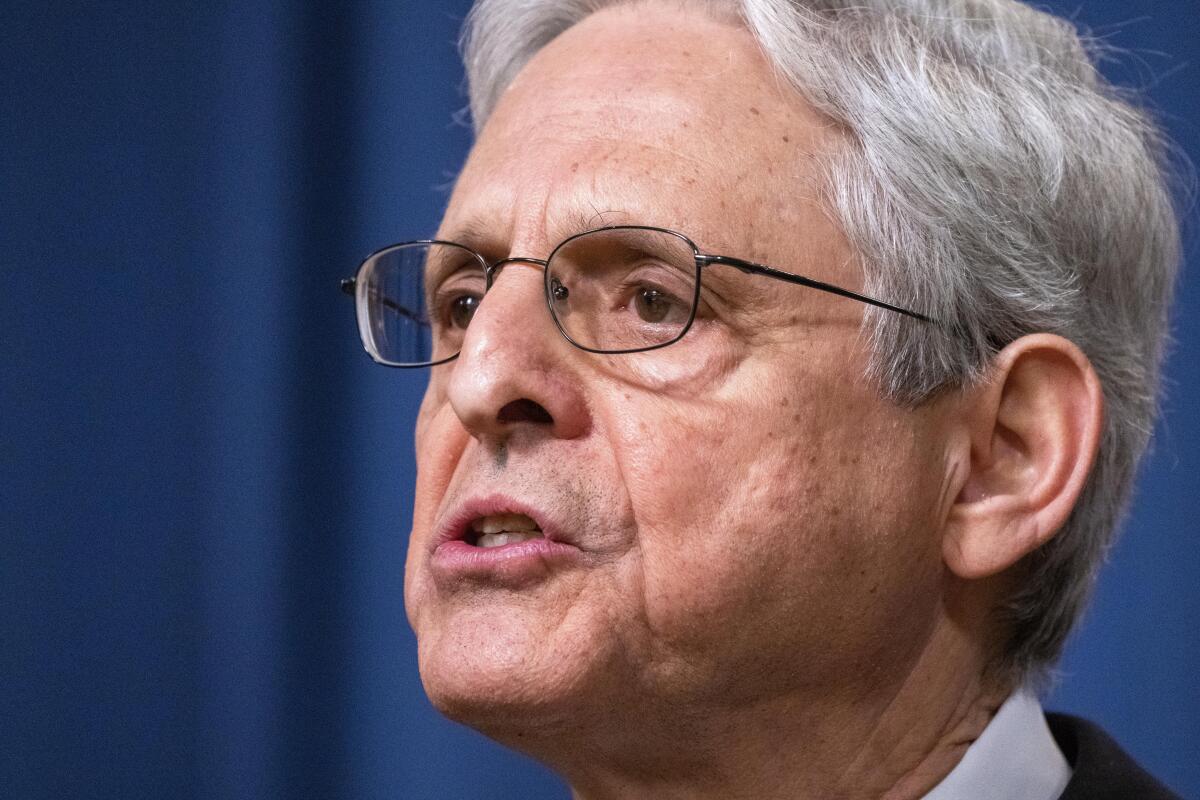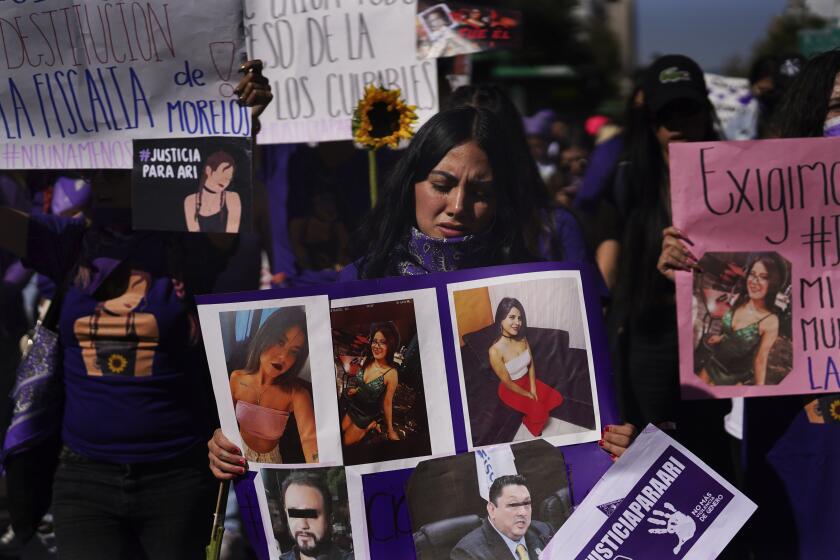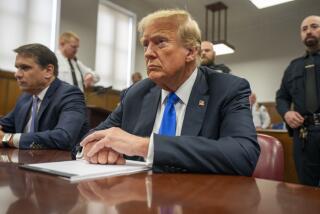Justice Department faces unprecedented test with election conspiracy case against Trump

WASHINGTON — When the Justice Department was announcing the highest-profile prosecution in its history in Washington, Atty. Gen. Merrick Garland was 100 miles away, meeting with local police in Philadelphia.
He stepped outside briefly to speak about how the decision to indict Donald Trump for conspiracy to overturn the 2020 election came from career prosecutors and was led by a special counsel committed to “accountability and independence.”
In other words, this wasn’t about politics.
Try as Garland might, though, there is no escaping the politics of the moment when the Justice Department of a president who is running for reelection is indicting his chief political rival, the front-runner for the Republican nomination.
And though he has distanced himself from the investigation since he appointed special counsel Jack Smith 10 months ago, Garland has the last word on matters related to the prosecution of Trump as long as he is the attorney general.
The Justice Department is navigating unprecedented conditions in American democracy while trying to fight back against relentless attacks on its own credibility and that of the U.S. election system. The success or failure of the case has the potential to affect the standing of the department for years to come.
“In grand terms this is a really huge historic moment for the Department of Justice,” said Wendy Weiser, vice president for the Democracy Program at the Brennan Center for Justice.
Mexico City arrests Uriel Carmona, Morelos state’s chief prosecutor, charging him with obstructing the investigation into Ariadna López’s death.
President Biden has sought to distance himself from the Justice Department to avoid any appearance of meddling when the agency is not only probing Trump, but also the president’s son Hunter. But it’s going to get more challenging for Biden, too. Anything he says about the Jan. 6, 2021, insurrection at the Capitol from now on could complicate matters for prosecutors. And any trial is likely to take place against the backdrop of the 2024 presidential election.
The latest indictment is the third criminal case filed against Trump this year, but the first to try to hold him criminally responsible for his efforts to cling to power in the weeks between his election loss and the Capitol attack that stunned the world. He pleaded not guilty on Thursday before a federal magistrate judge and was ordered not to speak about the case with any potential witnesses.
Trump has said he did nothing wrong and has accused Smith of trying to thwart his chances of returning to the White House in 2024. Trump and other Republicans have railed against the investigation and the Justice Department in general, claiming a two-tiered system of justice that vilifies Trump and goes easy on Biden’s son, who was accused of tax crimes after a years-long probe.
“Another dark day in America as Joe Biden continues to weaponize his corrupt Department of Justice against his leading political opponent Donald J. Trump,” said U.S. Rep. Elise Stefanik (R-N.Y.).
Trump’s own Justice Department was subject to complaints of politicization, drawing heavy criticism as the federal probe of Russia’s 2016 election interference thrust prosecutors center stage and dragged out scandals that Trump seized on as proof of a “deep state” operating against him.
The release of the Russia report by special counsel Robert Mueller was colored by politics, with then-Atty. Gen. William Barr issuing a four-page memo ahead of the report that was widely criticized as spinning the investigation’s findings in favor of Trump. Mueller’s actual report — two volumes and 448 pages — was far more nuanced and laid out in part how Trump directed others to influence or curtail the Russia investigation after the special counsel’s appointment in May 2017.
On Nov. 9, 2020, as Trump began to suggest with no evidence there might be widespread voter fraud, Barr issued a directive pushing prosecutors to investigate any suspected instances. But by the waning days of the Trump administration Barr had turned against Trump, telling the Associated Press before he told the president that there had been no widespread election fraud.
Garland, a longtime federal appeals court judge who had been Barack Obama’s choice for the U.S. Supreme Court but never got a hearing, was chosen by President Biden to be a stabilizing force. He promised to return the Justice Department to “normal,” restoring its reputation for political independence and ensuring equal justice.
Throughout his career, Garland has been steeped in Justice Department procedures and norms, and as a judge his decisions were thorough but “judicially modest,” said Jamie Gorelick, a lawyer who served as deputy attorney general in the 1990s and has been a Garland colleague and friend for decades.
“His view was, you do what you need to thoroughly and well and you don’t reach, you don’t do more than you have to do,” she said.
While Garland hasn’t been directly involved with the Trump case since naming Smith as special counsel, the indictment handed down Tuesday reflects a similar approach, she said. “It doesn’t rely on crazy new theories. It does not try to do more when less would be more effective,” she said.
Indeed, the indictment covered much of the same ground that played out on live TV, or was unearthed in the House investigation into the Jan. 6 insurrection, where violent protesters beat and bloodied police officers, smashed through windows and occupied the Capitol for hours.
If Smith loses the case, the Justice Department could lose credibility, particularly as the barrage of Republican attacks against the department grows. If prosecutors win, a former president could see time behind bars. If Trump is reelected, he could undo the charges and has said he plans to “completely overhaul the federal Department of Justice and FBI,” part of a larger effort by Trump to push more power toward the presidency.
“There are pieces now in play that the Justice Department is going to continue to take on for years to come,” said Robert Sanders, a senior lecturer of national security at the University of New Haven. “The next 12 months are going to be a critical stage in the history of this nation.”
Against that fraught backdrop, the broader work of the department goes on.
On the same day Trump was arraigned in Washington, federal prosecutors announced guilty pleas in a racist assault on two Black men who were brutalized during a home raid in Mississippi. And U.S. officials also announced the arrest of two U.S. Navy soldiers for spying for China in California.
Garland, during his Philadelphia visit, went almost immediately back to the community event he’d gone there to observe, chatting with police officers outside, as reporters shouted questions about the unprecedented indictment. But Garland wouldn’t bite.
“I appointed Jack Smith special counsel to take on the ongoing investigation in order to underline the department’s commitment to accountability and independence,” he said. “Any questions about this matter will have to be answered by the filings made in the courtroom.”
More to Read
Sign up for Essential California
The most important California stories and recommendations in your inbox every morning.
You may occasionally receive promotional content from the Los Angeles Times.











